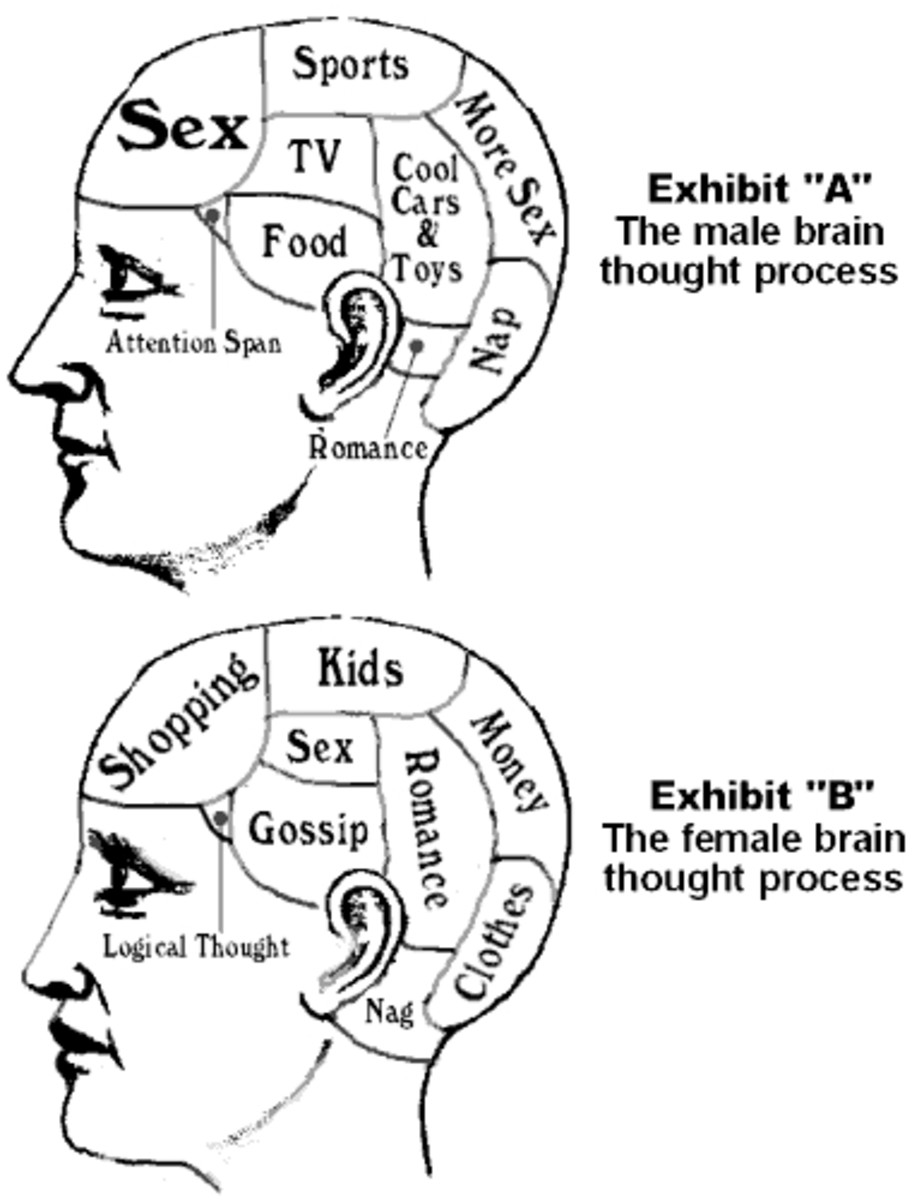What Makes Men (and Women) Anti-Feminist?

Dictionary.com defines feminism as "the doctrine advocating social, political, and all other rights of women equal to those of men." The feminist movement might define it more broadly, as trying to alter a patriarchal society that sets rigid gender roles for both men and women, and harms both in the process. Fully illustrating how men are privileged in our society and women are not can not be done in the span of an article, but to introduce the topic, let's look at a few facts.
First, men are privileged. What privilege means is that men have natural advantages in our society brought about by years of political, religious, and social supremacy that women do not have. Yes, today, men and women have mostly equal rights by the books (but not aways). Women can vote, after all, they can own land and property, hold jobs, inherit and generally participate in society as man's equal. But the image of men being stronger than women (mentally in addition to physically), men being breadwinners and women being child providers, and men being funnier, smarter, less prone to emotional outbursts, and ultimately more capable than women still exists. Here are some examples of how men are advantaged over women:
- The wage gap between men and women. Women receive, on average, 80.9% of the salary that men receive, and the pay gap in 2012 actually widened compared with 2012. This is partly accounted for by women striving for or only being able to get "pink collar" jobs such as secretaries, child care workers, waitressing, nursing or teaching, which tend to have lower wages. However, 40% of the wage gap is unexplained by occupation, experience, education or other measurable factors, meaning women are working the same jobs as men but are receiving less. The AAUW (American Association University for Women) found that in the exact same occupation, women are earning 7% less than men.
- In 2012, the percentage of female managers was only 38%. CEOs are much fewer than that - of the "Fortune 500" companies, only 12 are run by women.
- There is a similar disparity in politics. Men hugely outnumber women in the House and Senate today. We have never had a female president. Studies have also found - probably obvious to anyone who keeps up with politics - that media coverage of female politicians is brutal, focusing more on their personality traits and physical appearance than actual issues.
- In 2012, of the 100 most successful movies, women were hugely underrepresented in mere speaking roles - less than a third. Of the 100 highest grossing films, only 16.7% had female directors. Female characters are also more likely to be thin, attractive, and wearing sexually revealing clothing.
- Rape culture. Women are often blamed for being raped or sexually abused in terms of what clothes they were wearing, their behavior, or for flirting with men.
- Women must pay more for the same health insurance coverage that men have. Male reproductive health is assumed to be a standard part of healthcare, such as ability to get Viagra. Women's reproductive healthcare, such as birth control, is questioned and shamed. Reproductive rights are an additional struggle that women continue to face.
- America ranked only 22nd in the Global Gender Gap report in 2012. This measured factors such as health, political empowerment, economic opportunity and educational attainment in women.
- When women do make strides it is often met with contempt. For example, more and more women are the primary breadwinners for their families. However, this has lead to shocking outrage in some groups that support "traditional" roles. Anyone remember Fox News's all-male panel that laments over women who financially support their family to a greater degree than their husbands?
Doubting that sexism exists today in America is (or should be) impossible to do when looking at facts. But feminism has become a loaded word. "Strawman" feminism has persisted in image - feminists burn bras, hate men, don't shave their armpits and whine about tiny things like men having the audacity to introduce themselves. Sure, there are radicals in every social field, but I have never once met such a feminist outside of characters in evening sitcoms. Why do men - and even more heart-breakingly, some women - resent feminism?
As I asserted, men are privileged. Men are not judged by their appearance or sexuality to the extent that women are. But the context of feminism does, or should, address the dangers of strict gender roles that hurt men, too. A couple issues that men will bring up is - and I think they deserve to be brought up, too - are:
- Men suffer sexual abuse and rape just like women do. Yes, this is true! Resources for male victims are inadequate. But this is a feminist issue, too. Why? Because a patriarchal society assumes that men cannot be raped, that men are strong and assert dominance. Society views male rape as a form of taking away masculinity, of putting men in a victimized role like women.
- Men must sign up for the military draft, not women. It is wrong. But it is because women are perceived as weak and as having an obligation to "stay home with the kids." Women's equality in the military is another issue.
- In divorce cases, women often get custody of children. Again, this is because of women's perceived role of child care.
All of these issues are gender issues, and no matter what the reason, they are inequalities that men are facing, too. Discussion of gender equality is absolutely necessary, for the sake of both men and women. This is why men ought to consider themselves feminists, too.
So, why do some women hesitate to call themselves feminists, or actively bash feminists?
A subject of a class I took at university was Global Issues, and at the beginning of my class, my professor asked how many of us considered ourselves feminists. Two people, myself included, raised their hands. Then, he gave us a presentation listing some of the aforementioned statistics and more about women's inequality. After what I thought was a powerful presentation, he asked the same question again. Only about five people raised their hands, and this was in a class mostly comprised of women. What a problem! Media and pop culture have made "feminist" such a derogatory word that even in the face of facts, women themselves can deny the problem? Feminists on TV are often portrayed as man-hating comic reliefs, or militant lesbians. "The feminist movement" is often a phrase uttered with contempt. Some women resent feminism on religious grounds, citing their religious texts of choice obediently, even passionately quoting women's roles as subservient to men. Sometimes women question the data itself or give excuses for it.
I don't believe that there is a woman in the United States - perhaps even the world - who has never felt uncertain or unsafe because of her gender. Women almost everywhere are expected to conform to gender roles that hurt them. The gender roles of men too can be harsh. Feminism ought to be viewed as a movement to break down gender roles for both men and women, and empowering women in the very real face of inequality, which is a cause that everyone ought to rally behind without a second thought.







